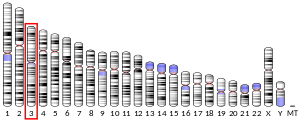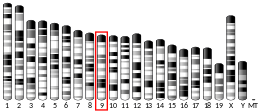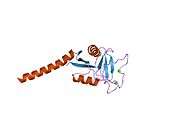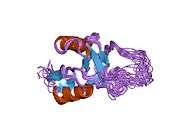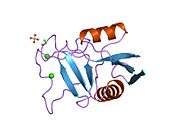CLEC3B
Tetranectin is a protein that in humans is encoded by the CLEC3B gene.[5]
References
- GRCh38: Ensembl release 89: ENSG00000163815 - Ensembl, May 2017
- GRCm38: Ensembl release 89: ENSMUSG00000025784 - Ensembl, May 2017
- "Human PubMed Reference:". National Center for Biotechnology Information, U.S. National Library of Medicine.
- "Mouse PubMed Reference:". National Center for Biotechnology Information, U.S. National Library of Medicine.
- "Entrez Gene: CLEC3B C-type lectin domain family 3, member B".
External links
- Human CLEC3B genome location and CLEC3B gene details page in the UCSC Genome Browser.
Further reading
- Wewer UM, Albrechtsen R (1992). "Tetranectin, a plasminogen kringle 4-binding protein. Cloning and gene expression pattern in human colon cancer". Lab. Invest. 67 (2): 253–62. PMID 1354271.
- Berglund L, Petersen TE (1992). "The gene structure of tetranectin, a plasminogen binding protein". FEBS Lett. 309 (1): 15–9. doi:10.1016/0014-5793(92)80729-Z. PMID 1511740.
- Borregaard N, Christensen L, Bejerrum OW, et al. (1990). "Identification of a highly mobilizable subset of human neutrophil intracellular vesicles that contains tetranectin and latent alkaline phosphatase". J. Clin. Invest. 85 (2): 408–16. doi:10.1172/JCI114453. PMC 296439. PMID 2298916.
- Clemmensen I (1990). "Interaction of tetranectin with sulphated polysaccharides and trypan blue". Scand. J. Clin. Lab. Invest. 49 (8): 719–25. doi:10.3109/00365518909091550. PMID 2533389.
- Clemmensen I, Petersen LC, Kluft C (1986). "Purification and characterization of a novel, oligomeric, plasminogen kringle 4 binding protein from human plasma: tetranectin". Eur. J. Biochem. 156 (2): 327–33. doi:10.1111/j.1432-1033.1986.tb09586.x. PMID 3009181.
- Fuhlendorff J, Clemmensen I, Magnusson S (1988). "Primary structure of tetranectin, a plasminogen kringle 4 binding plasma protein: homology with asialoglycoprotein receptors and cartilage proteoglycan core protein". Biochemistry. 26 (21): 6757–64. doi:10.1021/bi00395a027. PMID 3427041.
- Wewer UM, Ibaraki K, Schjørring P, et al. (1995). "A potential role for tetranectin in mineralization during osteogenesis". J. Cell Biol. 127 (6 Pt 1): 1767–75. doi:10.1083/jcb.127.6.1767. PMC 2120295. PMID 7798325.
- Nielsen H, Clemmensen I, Kharazmi A (1993). "Tetranectin: a novel secretory protein from human monocytes". Scand. J. Immunol. 37 (1): 39–42. doi:10.1111/j.1365-3083.1993.tb01662.x. PMID 8418471.
- Durkin ME, Naylor SL, Albrechtsen R, Wewer UM (1997). "Assignment of the gene for human tetranectin (TNA) to chromosome 3p22→p21.3 by somatic cell hybrid mapping". Cytogenet. Cell Genet. 76 (1–2): 39–40. doi:10.1159/000134509. PMID 9154122.
- Nielsen BB, Kastrup JS, Rasmussen H, et al. (1997). "Crystal structure of tetranectin, a trimeric plasminogen-binding protein with an alpha-helical coiled coil". FEBS Lett. 412 (2): 388–96. doi:10.1016/S0014-5793(97)00664-9. PMID 9256258.
- Kastrup JS, Nielsen BB, Rasmussen H, et al. (1998). "Structure of the C-type lectin carbohydrate recognition domain of human tetranectin". Acta Crystallogr. D. 54 (Pt 5): 757–66. doi:10.1107/S0907444997016806. PMID 9757090.
- Jaquinod M, Holtet TL, Etzerodt M, et al. (2000). "Mass spectrometric characterisation of post-translational modification and genetic variation in human tetranectin". Biol. Chem. 380 (11): 1307–14. doi:10.1515/BC.1999.166. PMID 10614823.
- Lorentsen RH, Graversen JH, Caterer NR, et al. (2000). "The heparin-binding site in tetranectin is located in the N-terminal region and binding does not involve the carbohydrate recognition domain". Biochem. J. 347. Pt 1 (1): 83–7. doi:10.1042/0264-6021:3470083. PMC 1220934. PMID 10727405.
- Graversen JH, Jacobsen C, Sigurskjold BW, et al. (2001). "Mutational analysis of affinity and selectivity of kringle-tetranectin interaction. Grafting novel kringle affinity ontp the trtranectin lectin scaffold". J. Biol. Chem. 275 (48): 37390–6. doi:10.1074/jbc.M004873200. PMID 10964919.
- Arvanitis DL, Kamper EF, Kopeikina L, et al. (2002). "Tetranectin expression in gastric adenocarcinomas". Histol. Histopathol. 17 (2): 471–5. PMID 11962752.
- Strausberg RL, Feingold EA, Grouse LH, et al. (2003). "Generation and initial analysis of more than 15,000 full-length human and mouse cDNA sequences". Proc. Natl. Acad. Sci. U.S.A. 99 (26): 16899–903. doi:10.1073/pnas.242603899. PMC 139241. PMID 12477932.
- Westergaard UB, Andersen MH, Heegaard CW, et al. (2003). "Tetranectin binds hepatocyte growth factor and tissue-type plasminogen activator". Eur. J. Biochem. 270 (8): 1850–4. doi:10.1046/j.1432-1033.2003.03549.x. PMID 12694198.
- Anderson NL, Polanski M, Pieper R, et al. (2004). "The human plasma proteome: a nonredundant list developed by combination of four separate sources". Mol. Cell. Proteomics. 3 (4): 311–26. doi:10.1074/mcp.M300127-MCP200. PMID 14718574.
- Gerhard DS, Wagner L, Feingold EA, et al. (2004). "The status, quality, and expansion of the NIH full-length cDNA project: the Mammalian Gene Collection (MGC)". Genome Res. 14 (10B): 2121–7. doi:10.1101/gr.2596504. PMC 528928. PMID 15489334.
- Hermann M, Pirkebner D, Draxl A, et al. (2005). "In the search of potential human islet stem cells: is tetranectin showing us the way?". Transplant. Proc. 37 (2): 1322–5. doi:10.1016/j.transproceed.2004.12.050. PMID 15848710.
This article is issued from Wikipedia. The text is licensed under Creative Commons - Attribution - Sharealike. Additional terms may apply for the media files.

